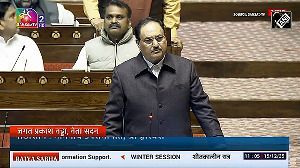Unfazed by the charge of trying to exploit religious sentiments for political gains, the Lok Janshakti Party has said installing a Muslim chief minister in Bihar was its mission and this in no way promoted ill-will between Muslims and other communities.
"LJP has taken up this mission not for immediate political gains but for promoting harmonious relations between various communities in the long run," party president and Union Minister Ram Vilas Paswan said.
He was replying to the Election Commission's notice on complaints filed by former Border Security Force director-general Prakash Singh and one Gaurav Kathuria, alleging that he was appealing to Muslim sentiments for votes in violation of the model code of conduct.
"When poltical parties could advocate reservation for Dalit Muslims in government jobs, what is the harm in talking about a Muslim chief minister? I do not think that my insistence is in any way violative of the model code of conduct," Paswan told reporters after releasing copies of the party's reply sent on October 24 to the EC.
Submitting a reply on behalf of the LJP president, R G James Kuttickattu, Paswan's counsel and LJP spokesman, said, "If continued elevation of Hindu chief ministers during the last 55 years has not created any feelings of enmity and hatred among the Muslims, how will our party's commitment to have a Muslim chief minister promote enmity, hatred and ill-will between Muslims and other communities."
'The LJP has consistently been championing the cause of national and emotional integration of the country. Our commitment to have a Muslim chief minister in law does not tantamount to seeking vote on the ground of religion or community', the letter said.
'This is not a gimmick on the eve of election to solicit votes of the community, but a manifestation of our continous pursuit for which LJP is enlisting, and hopes to obtain, support of most of the political parties,' LJP's reply to the EC said.
'LJP has put up candidates belonging to various communities and religions in the Bihar elections and the party has never appealed to the voters to vote for candidates belonging to a particular community or religion', it added.
'Had our party put up candidates belonging to a particular community alone and appealed to electors to vote for them alone, then probably Section 123 (3) or 3 (a) of Representation of Peoples Act, 1951 might have been evoked', Kuttickattu's letter said.
Seeking to reject the two 'misconceived and self-seeking' petitions, Kuttickattu, in his letter, quoted the Apex court judgement of Bal Thakeray vs Prabhakar Kashinath Kunte and said, 'If our intention was what the complainants impute, it would not have been our endeavour to enlist support of other political parties to agree to have a chief minister from a particular community'.




